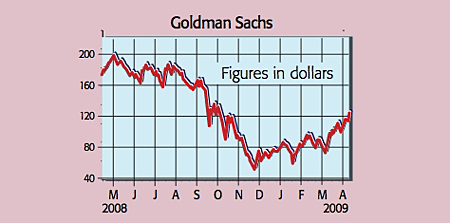
“For a moment, it looked just like the good old days,” said David Wighton in The Times. Goldman Sachs has reported a 20% year-on-year jump in net income to $1.8bn in the first quarter, a far better performance than expected and in line with results last seen in 2005/2006. And, “signalling a return to normality”, as Economist.com put it, the bank also set aside almost $5bn in salaries and bonuses for staff, increasing the size of the compensation pool by 18%. It has also raised $5bn in new equity to help it pay back the $10bn or so in capital that it took from the government, something it hopes to do pending official approval.
Banking sector: behind the numbers
But this hardly marks a return to the pre credit crunch era. For starters, Goldman was helped by a change in its reporting schedule that meant it did not have to include December in its results, a month in which it lost $1.3bn. So the good result was due to a record showing in the fixed income, currency and commodities division.
Even in bad times, companies need to engage in foreign exchange, commodity deals and hedging, said Alex Brummer in the Daily Mail. With many competitors having fallen by the way side, the survivors are cleaning up. Strong demand from companies keen to issue bonds, and a steep yield curve, are boosting the fixed-income division. But most divisions were weak. “A turnaround in the advisory, equities and asset management businesses”, for instance, is still “distant”, said Lex in the FT.
Banking sector: what next?
Goldman has always looked stronger than its rivals in this crisis. But a reminder that the bleeding in the sector hasn’t stopped was delivered by UBS this week. It forecast a $1.7bn loss for the quarter amid further writedowns on illiquid securities and credit losses. The Swiss bank also axed 11% of its staff. The basic question for investors is whether “banks will be able to earn their way out of the financial crisis” and rebuild capital, said FTAlphaville.com. Or will further write-downs cripple the financial system? The IMF reckons total global credit losses will reach $4trn, with three-quarters in banks, said Lex. Against that, one estimate reckons that global wholesale banking revenues will reach just $220bn next year.
The upshot is that losses are set to be so large that “it is barely conceivable that banks’ balance sheets can be repaired properly as things stand”, said George Magnus of UBS in The Times. If banks and the financial system are to recover, and underpin a sustainable economic rebound, the toxic assets will have to be tackled. Muddling through and “hoping for an economic recovery to turn up simply won’t do”.